#Moi Avenue
Explore tagged Tumblr posts
Text

2 notes
·
View notes
Text
Welp I made it 8 min into the 'Pedagogy in SF&F' panel before bursting into tears and closing Zoom.
#trauma? moi?#there are days when not being a teacher feels like someone reached down my throat and ripped oit my heart#but i dont see an avenue to go back that wont lead to me right back where i was when i left#which is to say isolated and suicidal and probably doing more harm than good#at least at my current job im just burnt out
5 notes
·
View notes
Text
A restaurant in Windsor, Ont., is cooking up extra food for people who cannot afford a meal — and dishing it out for free. But the staff say they're the ones getting the benefits. Ten Friends Diner, at the corner of Wyandotte Street and Moy Avenue, is a non-profit establishment that provides support and employment training for people with mental illness. The staff collect donations in a jar to pay for meals for anyone who can't afford them, said Steven Cromie, the restaurant's peer leader.
Continue Reading
Tagging @politicsofcanada
#cdnpoli#canada#canadian politics#canadian news#community aid#free meals#ontario#mental health#charity
132 notes
·
View notes
Text
Race to Capture the Flagbearer
Summary: On the eve of the start of the athletics events, the Torchbearer and the Flagbearer race to the Stade de France, betting that whoever enters the stadium first with the Flagbearer’s cape gets to chose the method of blessing the track.
Word count: 3.2k
Warnings: Established relationship. Sexual tension. Kissing. Very lame sexual innuendo I’m very sorry lolol
Notes: In honor of the start of the track and field events, my favorite because I used to run track, I give you this hot mess! This one really got away from me. Full disclosure: I have never been to Paris. GoogleMaps and Google Images were absolutely indispensable!
Once again, I strongly recommend reading The Torchbearer and the Flagbearer first, but if not, only a few details carry over: the two exist only during the Olympics, so they die and are reborn every two years; interaction with humans is strictly limited; and the Flagbearer’s horse is named Zeus. I use gendered pronouns only to distinguish between the two; otherwise, their physical descriptions are not gendered.
Read on AO3
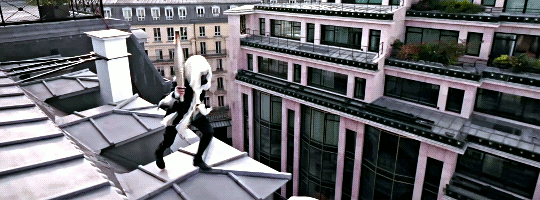

Beyond the city center, just north of the historic hilltop of Montmartre, Paris slumbers as though it were any other balmy summer night. A few stores and restaurants remain open, hosting those too restless to neglect the City of Lights. The low murmur of conversations warms the air beneath the amber glow of streetlights and the verdant canopies of deciduous trees. On the Avenue de Saint-Ouen, the soft, unmistakable clops of a horse turn the heads of those shocked to a standstill on the sidewalk.
The Flagbearer sways in her saddle as she guides Zeus down the northbound lane at a leisurely clip. The few cars caught behind them pass when able, unhurried by the late-night hour. Whispered surprise and pointing fingers follow in their wake. She turns and nods to the few aiming cameras and smartphones in their direction. Several meters behind on the northwest corner of the Boulevards des Maréchaux, two tourists watch the hooded figure continue on her journey.
“Where’s the other one?”
“Other one?”
“They’re always together at night.”
“What are you talking about?”
From behind them, a woman points up and shouts, “Là-bas!”
Heads tilt towards the rooftops. On the east side of the avenue, beyond the cover of the streetlights’ shine, onlookers catch the faint, bright material of the Torchbearer’s hood bobbing from building to building. The gauzy fabric travels quickly, seeming to fly across the uneven architecture, unbothered by safety or gravity.
Sounds of the spectators acknowledging the Torchbearer’s trajectory build to a wave that rolls down the road and crashes on the Flagbearer’s cape. Her hood turns around, the shadow beneath facing the line of buildings to her right. She whips forward and digs her heels into the horse’s sides. In a flash, the rider and her mount take off on a gallop, and the telltale signs of the nimble nightwalker disappear from the rooftops’ edge.
“What happened?” A fourth bystander, looking as confused as the first two, joins the three on the corner.
“Elle l'a vu.” The woman smiles and, with her fore- and middle fingers, gestures from her eyes to the rooftops to the north end of the street.
“Oh, uh, pardonnez-moi,” one of the two tourists attempts haltingly, “je ne parle pas français.”
“Dude, you don’t need to know French to know what this,” his companion mimics the woman’s gestures, “means. She said—”
“‘She saw him’ is what she said,” clarifies the fourth bystander.
“He’s chasing her?”
“Ils font la course.”
“I— Where’s my dictionary? Sorry, could you, uh— répétez, s'il vous plaît?”
“‘They’re racing.’ Dude, I’m going to strangle you.”
“What? But he can’t win. She’s on a horse!”
The woman and the fourth bystander share a laugh as they continue down the road. “Depends on where the finish line is!”
No announcements had been made declaring the particulars of this after-hours contest, but the more observant tourists and Parisians who had witnessed the two hooded figures about town before could more or less divine where they were headed. The Stade de France marked the end of their race, the venue housing the track for which their relay was honoring. No one, however, not even those with firsthand experience of past Olympic Games, could guess the particulars of their side bet.
“The athletics events begin in a few hours,” the Torchbearer had said to the Flagbearer, 90 minutes earlier, as they crossed the esplanade of the Palais de Chaillot in the direction of the Seine.
She hummed and smiled, gazing at the ground and matching his stride, her hands folded behind her back. “One of your favorites,” she said fondly.
From the top of the steps leading to the Jardins du Trocadéro, the Olympic Torch was still visible in the sky. Small groups of tourists flitted about the site, aiming all kinds of photographic equipment between the Olympic Flag flying above the Place du Trocadéro to the Eiffel Tower glittering above it all.
“The stadium is about 10 kilometers away,” the Torchbearer continued, pointing in a general northeasterly direction.
“I am aware of the distance, ma chère.”
“Shall we go over the rules?”
“Zeus,” the Flagbearer lilted, turning to face her mount, “do you need to be reminded of the rules?”
Following close behind, the horse shook his head. The two Olympic guardians had spent the last few nights inventing details to include the stallion in their quirky tradition. He was forbidden from trotting faster than 12 kilometers per hour, the average speed of a human man running. Only when the Torchbearer was in sight could Zeus gallop to his top speed; once out of sight, the horse would return to an average walk. The Flagbearer had offered to send Zeus ahead to the stadium in an attempt at fairness, but even she knew her armor was a handicap in the Torchbearer’s favor. She needed her steed.
“Perhaps we should lift the ban on mechanical vehicles, just this once,” the Flagbearer offered sheepishly. She felt guilty that for all of the Torchbearer’s physical prowess and show on the rooftops during the Opening Ceremony, he was still no match for one of Earth’s fastest land animals.
“No, my love. I do not believe Zeus gives you an undue advantage. Besides, I have my own ideas for bypassing our usual rule.”
“Oh?” She stopped at the edge of the esplanade and crossed her arms. “Then perhaps I should remind you that a bicycle is a kind of vehicle and therefore forbidden.”
The Torchbearer laughed. “I know better than to repeat my own mistakes. No, I have something even less mechanical in mind.”
“Would you care to share so that I may approve your means of cheating?”
He gasped and recoiled in faux offense, bringing his fingertips to his chest in mock shock. “Darling, how dare you accuse me of such a thing! It is not in our nature to cheat!”
“I know,” she conceded carefully before resuming her command, “but just because the equipment is featured in the Games does not mean it is allowed in our little competition. However, I suppose for tonight, I can allow you to skateboard.”
He chuckled and shook his head. “You still have not guessed correctly. No, I am certain these types of wheels are permissible. No human law has ever classified them as a form of transportation.”
The Flagbearer dropped her arms to her sides and squared her shoulders, straightening her posture. “Now I am intrigued.”
Light cheers and applause bubbled up around them. The two looked up in time to watch the Olympic Torch descend out of sight. Only the Eiffel Tower remained bright in the inky night.
“That is your cue, chérie.” The Torchbearer extended a hand in a show of sportsmanship. “Good luck.”
The Flagbearer accepted the gesture. “Bonne chance à toi, aussi, my dear. If you do reach me, try not to pull too hard. Falling from Zeus’s height would hurt even more in this armor.”
“I shall hold back my strength for your safety, mon amour. Now go.”
The Torchbearer watched his partner mount her steed and quickly gallop back through the esplanade, gaining more spectators with each echoing hoofbeat. When she reached the road, she brought Zeus to rear on his hind legs. Gasps of surprise followed. Once Zeus righted on all four legs, she blew a kiss to the Torchbearer who caught and tucked it into his vest against his chest. With a nod, horse and rider trotted in the direction of the Arc de Triomphe. He waited for the sound of hoofbeats to fade away before running down the steps and across the garden and banking left to try to cut them off through neighboring roads.
What would normally have been a swift, straightforward race from the Place du Trocadéro to the Stade de France turned into an extended excursion into the more hidden side streets of Paris. Previous incarnations of the Olympic guardians allowed them to run unencumbered. The Flagbearer’s armored form, paired with Zeus’s presence, meant that they needed a creative twist to make up for their unique limitations. Eyeing the Flagbearer’s cape one night, the Torchbearer suggested a riff on the rules of Capture the Flag: one flag and one territory instead of the usual two each, her cape standing in for the desired marker and the stadium the sole safe place. Whoever entered the Stade de France first with the Flagbearer’s cape would win. What was once a race became a chase.
For more than 10 kilometers, the Flagbearer evades the more agile Torchbearer. She never hears him coming, his footsteps too light even in the silence of empty streets. She had been halfway through the Parc Manceau, hoping to use its lawns and trees to muffle Zeus’s steps, when she felt a rush of air graze her right leg. Her arm shot behind her and grasped her cape, its tough material caught up in the momentary gust. She sighed in relief just as the scrape of plastic wheels echoed on the pavement. She turned around and watched the Torchbearer come up from a crouched position and straighten up a few inches taller than his usual height.
“Rollerblades!” The Flagbearer was impressed. “Darling, you think of everything.”
He laughed. “They are not as quiet as I need them to be, but at least I have a chance to match Zeus’s trot.”
“It is not your speed that needs improvement.” She threw her cape behind her, taunting him as it fluttered back into place. “Your grip is lacking, my dove.”
With a swift tug of her reins, she brought Zeus to a gallop across the lawn where the Torchbearer’s wheels could not follow. He glided down a path to try to cut them off at the park’s edge, but lost sight of them behind the foliage. He stared at the five-road intersection and quickly picked up Zeus’s hoofbeats echoing down the Rue Georges Berger. Though he couldn’t see the source of the sound, he was sure of its direction. He took off down the Rue de Thann, hoping to catch them at the Boulevard Malesherbes. When he reached the corner, he found Zeus waiting riderless. The Flagbearer would repeat this strategy throughout the night.
With Zeus’s hoofbeats no longer a reliable sign of his partner’s presence, the Torchbearer takes to the rooftops for the higher vantage points. He flies freely — no cars or pedestrians to block his journey, no trees or walls to block his view. Despite the cloak of darkness hiding potentially dangerous nooks on which to trip, his step is sure. He falters only when he reaches the main thoroughfares, several lanes too wide to jump, and is forced to climb back down to the sidewalk. When he swivels around, hands on his hips and unsure of the Flagbearer’s location, a few wide-eyed tourists point him in the right direction. He nods or salutes before sprinting to the nearest building and resuming his flight across the darkened rooftops.
Meanwhile, the Flagbearer continues to use sound to her advantage. When she is not deploying Zeus as a decoy, she also relies on the few onlookers in her wake. Every time the Torchbearer nears, a low swell of claps and gasps announces his proximity, the spectators’ excitement at witnessing the phantom figure reenact his debut performance rippling through the air like a lighthouse beacon on a foggy night. The audible warning allows her enough time to pinpoint his location and break for a darker or wider street. Despite the weight of her armor and the agreed-upon limitations on Zeus’s abilities, she manages to stay ahead and out of reach of the Torchbearer.
Eventually, after breathless hours of looking over her shoulder, the Flagbearer comes into sight of the Stade de France. She is relieved but restless. It had taken longer to reach the stadium than she’d anticipated, and her daytime duties began to slip into the forefront of her mind. She senses dawn just below the horizon, hiding for another hour before warming Paris once more. She felt the urgency of concluding their game.
With no sign of the Torchbearer, the Flagbearer dismounts and walks the remaining distance to the parking lot surrounding the stadium. Zeus’s hoofbeats punctuate the whoosh of the few cars passing on the highway. They are 100 meters from a western gate when she hears the familiar roll of plastic wheels fast approaching behind her.
Without turning around, she smacks Zeus’s rump and grabs the horn of her saddle. She lifts herself high enough to put a foot in the stirrup as the stallion gallops towards the gate. She clings to her steed’s side, pushing sore muscles to their breaking point as her cape whips and drags in the wind. She pulls herself up and over to straddle the saddle and grasps for enough stability to turn her head around. She sees no hooded figure.
Only when Zeus stops abruptly in front of a gate does she see the Torchbearer. He had rolled to a stop a few meters from her position, holding her cape aloft in his right hand and waving low with his left. The Flagbearer quickly dismounts and points for Zeus to step away from the gate.
“Looks like I won, my sweet,” the Torchbearer taunts across the distance.
“Not yet, darling.” The Flagbearer advances slowly, cracking her neck and loosening her shoulders for what she assumes could turn into a wrestling match. “You have not entered the stadium proper. This parking lot is open space.”
His right hand drops to his hip, her cape billowing in the breeze. “You cannot outrun me in your armor.”
“Then play fair, ma chère. You know your agility is hampered by those tiny wheels.”
He lets out an amused huff before agreeing to her concession. He kneels on her cape, alternating knees so as not to lose it to the wind, and takes off the rollerblades. From behind his jacket, he produces and quickly puts on his shoes, readjusting his leg gaiters over the treads. All the while, the Flagbearer maintains her distance.
“A lesser opponent would have rushed me by now,” the Torchbearer observes as he stands up.
“A lesser opponent would have conceded defeat,” she counters as she steps forward.
He strides to the side, and she mirrors his move. “How do you imagine this will end, my dear?”
“With you pinning my cape back on me and blessing the track my way.”
“Darling, I would gladly pin you any day, but do tell what you had in mind if you do indeed win.”
The Flagbearer shakes her head as she takes another step closer. “As much as I enjoy your sense of humor, I would not deign to give you ideas before my victory is secured.”
“A wise move perhaps, but in truth, you read my mind.” The Torchbearer jumps several steps to the right, the entrance briefly in view, before she blocks him. “I can tell you with the utmost certainty that when I win, I shall pin you on the track.”
He is close enough to spy a smirk on her lips. She giggles and says, “And you call me insatiable.”
“My hunger burns eternal for you, my angel sweet.”
She comes up to her full height and points a finger in his direction. “You are distracting me.”
“An effective strategy, I would say. I have lured you away from the entrance.”
“By closing the distance between us.” The Flagbearer reaches out and jabs the Torchbearer’s shoulder with a firm finger. She enters into a slight crouch, palms outstretched, ready to reclaim her cape.
“Well, if we are to dance, mon amour,” he takes her cape in both hands and bunches opposing corners in his fists, “we must step closer.”
He swings the length of the cape over the Flagbearer’s head and around her shoulders, pulling her into his chest. She looks up, grabs the remaining free corners fluttering above their heads, and swings them behind his shoulders. They land in each other’s arms, enveloped by the Olympic Flag.
Hidden beneath the cover of the opaque cape, the Flagbearer removes her gloves, stuffs them into her belt, and brings gentle fingertips to the bottom edge of the Torchbearer’s mask.
“You win, my love. Would you like a taste of your prize?”
She lifts the mesh just enough to expose his mouth. His breath warms her hand as she presses the pad of her thumb across his soft lips. She cradles his jaw in both hands, keeping his mask in place over his nose, as they meet for a fevered kiss.
Only the Flagbearer is privy to the face beneath the Torchbearer’s mask, the covering quickly removed during private moments behind closed doors. No rule existed banning the public exposure of their countenances, but the Olympic guardians thought it best for their appearances to remain as neutral as the intentions behind the performance of their duties. They are as much a symbol of the Games as they are its players, and only with their features hidden can they best represent the best of humanity in all its forms and functions.
From the top of the steps leading to the upper parts of the stadium, the crackle of a security guard’s radio travels through the air and interrupts the lovers. They part lips with heavy sighs, reluctant to meet the world and its inhabitants.
“Change of plans,” the Torchbearer mumbles as he chases the Flagbearer’s chin with his mouth and finds the lower edge of her cuirass with his hands. “This audience will not do.”
She giggles and runs her hands down his chest, searching for the warmth beneath his many layers. “Our race took too long. If only we had reached the stadium sooner,” she sighs as he traces her jaw with the tip of his tongue and latches his lips just below her ear, “when it was less populated.” She pulls him closer, reaching for the backs of his neck and waist.
“A simple walk must suffice.” He pulls away, lowering the Flagbearer’s hands by her wrists. “I have had enough racing for tonight.”
“Have I worn you down?” She tugs on the Torchbearer’s lapels.
He laughs as he removes her gloves from her belt and glides them over her hands, the wind at his back keeping the cape in place. “I bow to your mastery of stealth and strategy.”
“Well, I learned from the best.” She readjusts his mask under his chin before he flips the cape behind her and secures it under her spaulders. “Be honest, dear, did I tire you too much?”
“I can manage a 400-meter walk.”
“And afterwards?” The Flagbearer nudges her hand into the crook of his arm, pressing her shoulder to his, and starts towards the stadium.
“I have enough strength for my duties. You need not worry.”
“I know. I had hoped for my own blessing before sunrise.”
The Torchbearer laughs to the sky before swinging his arm around her waist and opening his side to her embrace. “Darling, you truly are insatiable.”
“I merely wish for you to claim your prize.”
“The walk around the track—”
“Is still part of our duties. Your prize for catching me is far more enjoyable.”
He stops to hold her hands and run a finger along her jawline. “Then let us race properly, quickly around the track, so I may claim you.”
The Flagbearer giggles and starts down a tunnel leading into the belly of the stadium, the weight of her boots and the drag of her cape slowing her sprint. The Torchbearer captures her quickly.
Translations: Là-bas! - Over there! pardonnez-moi, je ne parle pas français - forgive me, I don't speak French répétez, s'il vous plaît - repeat, please Bonne chance à toi, aussi - Good luck to you, too
#*#olympics#paris 2024#olympics 2024#paris olympics#silvertorch#phantom of the olympics#phantom torchbearer#phantom of the games#torchbearer#assassin's creed torch bearer#flagbearer#flag knight#fic#fanfic#fanfiction#gifs are mine#why do i always pick the dying ships lolol KEEP 'EM ALIVE FOLKS#masked torchbearer
49 notes
·
View notes
Text


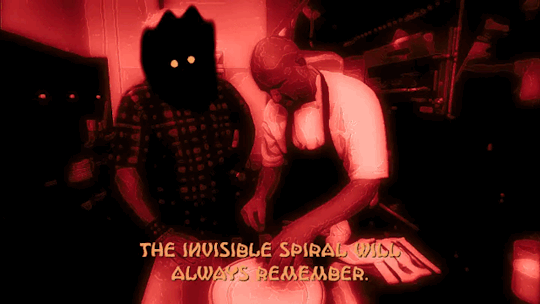
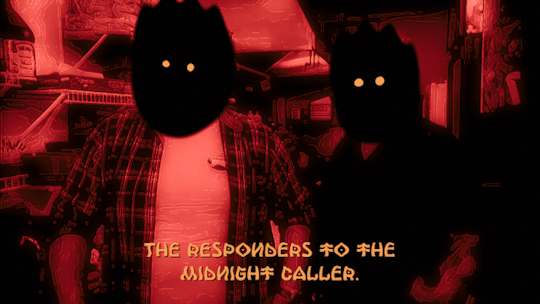




[Farewell vicious night. The Ancient Fire calls your name. The invisible spiral will always remember the responders to the Midnight Caller. The ones who write the stories. And to whom the stories go. Perhaps the eternal moon will rise again. Perhaps the darkness has reached its end.]
XIV - La Ville Invisible
Après être arrivé au lieu où se confondent existence et non-existence, une porte verte est apparue, invoquée là depuis les plaines pastorales de la plus ancienne Arcadie. J'ai chanté à la porte ces paroles qui précédaient les ténèbres : Daphnis ego in silvis, hinc usque ad sidera notus.
Des années de mystère m'avaient amené à ce seul paragraphe. Un voyage où, à chaque étape du chemin, j'espérais une conclusion, mais j'ai reçu davantage de questions à la place. Cette fois ne faisait pas exception.
Je l'ai répété encore et encore dans mon esprit. C'était enivrant. Ça ressemblait à une incantation pour des esprits puissants, comme écrit dans les livres. Mais les esprits ne sont jamais venus à moi. Même mes rêves avaient commencé à échapper à ma mémoire, comme l'amnésie dans une berceuse.
J'ai appris autant que possible sur la partie la plus significative du paragraphe : Daphnis ego in silvis, hinc usque ad sidera notus. Je fus Daphnis, habitant des bois, d’où mon nom s’est élevé jusqu’aux cieux. Cette épitaphe qui apparaît sur de nombreuses pierres tombales arcadiennes. Les origines mêmes de l’expression Et In Arcadia Ego. Les mots qui ont précédé les ténèbres.
J'ai appelé Mars Éditions encore et encore, personne ne répondait. Je suis allé au 12 Rue Jacob, mais l'enseigne au néon était éteinte et il n'y avait personne à l'intérieur. J'ai appelé The Library of Babel à Londres où j'ai acquis Nuit Sans Fin, sachant exactement à quoi m'attendre. C'est-à-dire pas de réponse.
Il me semblait que j'étais vraiment seul.
Dès le début, on avait eu l’impression que quelqu’un, ou peut-être l’univers, essayait de parler sans voix. Si j'étais honnête avec moi-même, aussi fou que ça puisse paraître, j'avais l'impression que Leonora elle-même essayait de me dire quelque chose. Chaque fois que j’arrivais dans une impasse, j’avais l’impression de la laisser tomber.
Cette ultime impasse n’a fait qu’intensifier mon intérêt pour cette phrase latine particulière et tout ce qui l’accompagnait. J'ai plongé non seulement dans le monde de l'épopée romaine et de la mythologie celtique, mais aussi dans celui de Leonora et d'autres artistes surréalistes. Livres, expositions, cours du soir, documentaires, tout ce que je pouvais trouver.
Je dois admettre que le rayon de ce nouvel intérêt s'est élargi de jour en jour et j'ai découvert de nouvelles avenues et de nouveaux mystères à explorer. Remedios Varo, Dorothea Tanning, Noëmi Manser, Kati Horna, Hilma af Klint, Julia Soboleva ont tous transformé ma vie en un rêve ambulant et ont ajouté une touche de magie à ma façon de penser et de voir le monde. Comme si mes yeux s'étaient ouverts sur “l'autre Paris”, l'invisible, les passages secrets entre les couches.
Malgré cela, Leonora ne m'a jamais quitté. J'ai une obligation envers elle que je n'ai pas remplie. Je ne sais pas quand, je ne sais pas comment, mais j'espère plus que tout qu'un jour je pourrai répondre à l'appel. Que si je peux enfin être là pour elle. Pour son esprit. Pour jouer mon rôle. Il y a une raison pour laquelle elle m'a trouvé, mais je ne la connais pas encore.
En attendant, je la garde dans ma vie. Dans mes rêves, en cette nuit sans fin. 𑁍
#s22e06 from atlantic to pacific#guy fieri#guyfieri#diners drive-ins and dives#i tego arcana dei#terra incognita#ancient fire#invisible spiral#midnight caller#eternal moon
41 notes
·
View notes
Text

Pour la quatrième fois, la commune de Neder-over-Heembeek organise le 16 & 17 novembre 2024 de 10h à 17h une balade artistique.
Ce sera l’occasion pour moi d’ouvrir les portes de mon atelier et même si le lieu ne ressemble en rien à une galerie, de vous proposer une petite exposition de mes travaux.
L’adresse: 136 Avenue des Croix de Guerre à 1120 Bruxelles
5 notes
·
View notes
Text
On Hérault's Orgy Cave
@divinaaugusta I wrote about this in the past (my pet topic, guilty as charged), but I have trouble locating relevant info on my blog because Tumblr my beloved.
We learn about the sex/orgy cave from the book by his mistress Suzanne de Morency, "Illyrine ou l'Écueil de l'inexpérience". She describes their relationship, including how he bought her a lottery and rented a luxurious house for her near Champs-Élysées. In 18c, there was no avenue, but we know its approximate location, near the convent St Périne (now a hospital). Here is how the area looked in the 1730:

So, near rue de Chaillot in 18th century.
As I understand, in 1790s that was a nationalized property that Hérault rented for Suzanne. As part of the complex, there was a garden with an artificial grotto. These grottos were all the rage in the 18th century. Here is one belonging to Frederick the Great: Neptune Grotto (although no idea if this one - or grottos in general - were used for the same purpose as how Hérault used it). Apparently, Hérault's grotto/cave included a little brook, flowers, and comfortable furniture (including a chandelier). She describes:
Chérubin [Hérault] me prie d'ôter mes bas , parce qu'il faisait chaud , et il se désha billalui-même, passa seulement une grande lévite de bazin doublée de taffetas bleu : il me prend la main , me fait traverser le parterre ; j'apperçois un petit portique du quel il m'avait toujours soigneusement écartée ; et il avait un grand soin de ne pas me perdre de vue depuis notre arrivée. Enfin , ouvrant la porte de ce portique , il me présente à l'amour , qui m'offre une guirlande de roses fraîches ; puis il me dit : Adèle ; vois son inscription. Je le regarde en souriant; il me donne un baiser , dé noue ma ceinture , marobe , et à l'instant je n'ai plus de vêtement que la guirlande que l'amour m'a donné : mon amant a la même parure : il ouvre la porte sacrée ; nos pieds foulent le gazon. Il me conduit à un lit de jonc dont le ciel était un grand myrthe. Mon amant s'était ménagé toute la soirée pour ce lieu enchanteur…. Je ne puis te peindre tous les plaisirs que nous goûtâmes : je ne trouverais pas de pinceau assez habile ; ils sont plus faciles à imaginer qu'à peindre. Mais Séchelles est plus qu'un homme si j'ai quelquefois dit que mon mari et Q…..te étaient autant au- dessus du vulgaire qu'étaient les anges au- dessus de l'humanité, je dirai maintenant qu'Hérault de Séchelles est autant au - dessus de mon mari et de Q…..te que la divinité est au dessus des anges. Nous nous restaurâmes par des glaces et des liqueurs ; tu en connais l'effet …. De nouveau nous nous épuisâmes : nous passâmes la nuit dans ce charmant réduit.
Illyrine ou l'Écueil de l'inexpérience, tome 3 , pages 273-274.
(If anyone would like to translate, that would be great! My French sucks for that, but even Google translate gives you the vibe).
The description starts on page 270, with the description of the house, and then the garden and the portico and the inscription "Fuyez loin d'ici , profanes , si vous n'êtes purs et nuds comme moi" ("Flee far from here, profane people, if you are not pure and naked like me"), to which Hérault - obviously - suggests them to undress. And they did. (Sadly, she doesn't describe the encounter, except that it was amazing and that he served drinks and ice-cream after).
Suzanne says that they visited the cave more than once, sometimes with another couple (so, not just sex cave but also an orgy cave). Again, she doesn't go into details, but she makes it clear what kind of activities went there.
So... that's the story of this particular 18th century spot! :)
About Hérault's Mistresses in another post, because it will be long (as one might imagine).
40 notes
·
View notes
Text

Miles Davis embrasse sa femme à sa sortie de prison après avoir été tabassé par des policiers blancs avant son concert au mois d'août 1959.
Un soir de 1959, Miles Davis, musicien dont le succès n’est plus à prouver, sort prendre l’air accompagné d’une amie blanche devant le Birdland, un club de jazz new-yorkais où il est à l’affiche. Il se tient là, debout sur un trottoir de Broadway Avenue et derrière lui son nom scintille en lettres lumineuses sur le fronton du mur. Un policier blanc débarque et lui demande de circuler. Davis lui explique qu’il travaille dans le club et qu’il est attendu sur scène. L’homme réitère son ordre, le musicien ne bouge pas. Alerté par son collègue, un autre policier arrive en renfort et le roue de coups. Le trompettiste, ensanglanté, est embarqué au commissariat et inculpé de résistance et voies de fait sur un agent de la force publique. Une nuit et une caution de mille dollars plus tard, le musicien est libéré…
Un photographe, Stanley Hall, qui rôdait en quête de scoop, se presse pour immortaliser l’instant : un Miles David, défiguré par les forces de l’ordre, quelques bandages sur ses plaies et le costume maculé de sang. Coup de pub retentissant, la photo a été reprise dans le monde entier et la ville de New York contrainte de laver le casier judiciaire du musicien innocent.
8 notes
·
View notes
Text

La Mode nationale, specimen, 1 decembre 1885, Paris. No. 1. — Toilette de dîner. Modèle de la maison de l'Opéra, 20, avenue de l'Opéra. Bibliothèque nationale de France
No. 1. Robe de dîner en broché grenat de Syrie. Le corselet lacé à l'Agnès Sorel et les parements de la manche en velours grenat tréflé d'or, avec bordure de grosses perles d'or en ourlet. La guimpe froncée est en satin et colletée de velours.
No. 1. Syrian garnet paperback dinner dress. The Agnès Sorel laced corselet and the sleeve cuffs in gold-trefoiled garnet velvet, with a border of large gold pearls at the hem. The gathered wimple is satin and trimmed with velvet.
Notre Programme
En prenant pour titre: La Mode nationale, nous avons voulu affirmer hautement nos intentions de ne donner place dans nos colonnes qu'aux modes vraiment françaises. Sans vouloir faire ici de politique et sans témoigner d'un chauvinsime exagéré, nous ne pouvons pourtant nous empêcher de constater les prétentions de nos voisins, qui, surtout depuis 1870, se sont mis à nous disputer le privilège de la mode, lequel nous a appartenu, sans conteste, pendant des siècles.
Certains gravure de modes nous viennent de l'étranger, sous prétexte que la main-d'œuvre est là-bas meilleur marché que chez nous: de là un tort réel apporté au commerce national, parce que ces gravures sont la reproduction de modèles qui ne sont pas les nôtres.
La Mode nationale maintiendra très haut le drapeau de l'industrie française. Notre journal, confié à nos meilleurs artistes, n'empruntera rien aux étrangers. C'est dire qu'il est destiné à devenir le modèle du bon ton et l'organe accrédité de la bonne compagnie.
La Mode nationale paraîtra réguilièrement le 1er et le 15 de chaque mois, à dater du 1er janvier 1886.
La Rédaction.
—
By taking the title: La Mode nationale, we wanted to strongly assert our intentions to only give space in our columns to truly French fashions. Without wanting to get political here and without showing exaggerated chauvinism, we cannot help but note the pretensions of our neighbors, who, especially since 1870, have begun to dispute with us the privilege of fashion, which has belonged to us, without question, for centuries.
Some fashion engravings come to us from abroad, under the pretext that labor is cheaper there than at home: hence a real harm to national trade, because these engravings are the reproduction of models which are not ours.
La Mode nationale will keep the flag of French industry very high. Our newspaper, entrusted to our best artists, will borrow nothing from foreigners. This means that it is destined to become the model of good tone and the accredited organ of good company.
La Mode nationale will appear regularly on the 1st and 15th of each month, starting from January 1, 1886.
La Rédaction.
#La Mode nationale#19th century#1880s#1885#on this day#December 1#periodical#fashion#fashion plate#cover#cover redo#description#bibliothèque nationale de france#dress#dinner#Modèles de chez#Maison de l'Opéra
20 notes
·
View notes
Note
Hello! Since you're tumblr's Marie Sophie expert, I was wondering if you've read Lorraine Kaltenbach's Le Secret de la reine soldat: L'extraordinaire soeur de Sissi and in case you have, if you recommend it. It focuses on Marie Sophie's supposed illegitimate daughter; personally I find this story hard to believe and iirc so do you, but Kaltenbach apparently visited several archives around Europe to do her research, so maybe she did find something new.
Hello! Ughh that book. I have a confession to make: years ago I started reading it because well, it's about the alleged illegitimate daughter, if the author really found something about it then it's worth reading it. But I couldn't finish it because it was so badly researched it made me loose all my patience. Kaltenbach is not a historian and it shows:
She dedicates long parragraphs to describe what was she doing and how was she feeling while "researching".
Most of her sources are just newspapers. I'm not against citing newspapers by any means but the way she did Is Not It. With no context given and taken 100% at face value.
But what made me loose it is when she finally reached to the the alleged affair and I realized her main source for it was... Marie Larisch's 1930s books. I kid you not. All that "brand new information" and "uncovering secrets" talk and she was literally just quoting Larisch's gossips as literally everyone else who ever approached the subject.
At that point I gave up and went straight to the part of the alleged daughter, Daisy de Lavaysse. Here's what I'll say on Kaltenbach's defense: this girl seems to have actually existed. She (allegedly) found her death certificate in Paris, the act of recognition by her father, and her baptism certificate in Bavaria. Now she doesn't actually show any of these documents on her book, however someone on Geneanet uploaded this picture on Daisy's page:

This is the supposed death certificate. No need to decipher the writing, this is what it says, quoted by Kaltenbach:
Lavaÿsse-Châteaubourg. Acte n° 39. L'an mille huit cent quatre-vingt- six, le 7 janvier à onze heures du matin, acte de décès de Marie Louise Élisabeth Mathilde Henriette de Lavaÿsse-Châteaubourg, âgée de vingt-deux ans et dix mois, sans profession, née à Munich (Bavière), décédée en son domicile rue des Mathurins, nº 47, le six janvier courant à neuf heures du matin, fille de Charles Felix Emmanuel de Lavaÿsse-Châteaubourg, décédé, et de mère non dénommée, célibataire. Dressé vérification faite du décès par nous, Jérémie Kastler, adjoint au maire, officier de l'état civil du 8e arrondissement de Paris, chevalier de la Légion d'honneur, officier d'Académie, sur la déclaration faite de Georges Adrien Sol de Marquein, âgé de quarante-deux ans, propriétaire, demeurant à Paris, rue de Lisbonne, n° 49, ami de la défunte; et de Henry de Gineste-Najac, âgé de quarante-sept ans, propriétaire, demeurant à Paris, avenue d'Antin, nº 18, ami de la famille, qui ont signé avec nous après lecture.
Translation:
Lavaÿsse-Châteaubourg. Act No. 39. In the year one thousand eight hundred and eighty-six, on January 7 at eleven o'clock in the morning, death certificate of Marie Louise Élisabeth Mathilde Henriette de Lavaÿsse-Châteaubourg, aged twenty-two years and ten months, without profession, born in Munich (Bavaria), died at her home rue des Mathurins, no. 47, on the current January 6 at nine o'clock in the morning, daughter of Charles Felix Emmanuel de Lavaÿsse-Châteaubourg, deceased, and of an unnamed mother, unmarried. Cerification of the death made by us, Jérémie Kastler, deputy mayor, civil registrar of the 8th arrondissement of Paris, knight of the Legion of Honor, officer of the Academy, on the declaration made by Georges Adrien Sol de Marquein, aged forty-two, owner, residing in Paris, rue de Lisbonne, n° 49, friend of the deceased; and Henry de Gineste-Najac, aged forty-seven, owner, residing in Paris, avenue d'Antin, n° 18, friend of the family, who signed with us after reading.
Let's assume the certificate is legitimate. Why didn't she include it on her book? Why the only picture of it is in a genealogy website and seems taken almost in a hurry?
The strongest evidence Kaltenbach does provide in her book are these two alleged pictures of Daisy she claims were on her grandmother's possesion:


Which she puts next to this picture published by Marie Larisch (left) in one of her books, with a girl that allegedly was Daisy (right):

And I'll give her this: these two pictures do seem to be from the same person.


I'm going to be nice and assume that Kaltenbach indeed found all the evidence she claims she did (because again, she does not provide any of the documents that would actually support her claims). What did she found out? That a distant relative of her had an illegitimate daughter born in Bavaria in 1863. That's it. Everything else is pure speculation. Nothing she provides proves that Marie was Daisy's mother. Absolutely nothing. She just speculates for dozens of pages, most of the time making up a story that fits nicely into what she already believed even before starting her research.
Maybe the author was genuinely onto something, perhaps Daisy was an illegitimate daughter of a member of the House of Wittelsbach. Perhaps she was Marie's daughter after all! But she clearly had no idea on how to properly investigate the subject, and because of that any sort of credibility her evidence could have became damaged. She should've delegated the research to a real historian and written a novel instead.
#in order to answer this ask i skimmed through some chapters again and came across a part in which kaltenbach openly admits that#she postponed going through her family papers for weeks because she felt lazy jfjkg this was when she had already started her ''research''!#anyway perhaps one one day i'll read this book fully for completionist purposes#asks#queen marie sophie of the two sicilies#author: lorraine kaltenbach#Le secret de la reine soldat: L'extraordinaire soeur de Sissi
5 notes
·
View notes
Text

Jeudi 6 février 2025.
Au cours de leurs voyages, les photographes ont souvent été amenés à photographier des drapeaux. Cérémonies officielles, obsèques, rencontres sportives, dates anniversaires. Les drapeaux sont là pour rappeler des évènements mettant en valeur leur(s) pays. Nationalisme, histoire, emblème d'une nation, ils sont souvent utilisés comme des symboles d'unité, mais aussi comme un lien entre les citoyens d'un pays vers lequel on se tourne dans des moments de tristesse ou de grande joie.
Barcelone, Dimanche 8 Février 1976.
Des milliers de catalans ont manifesté à Barcelone, à l’appel de l’assemblée de Catalogne, en faveur de l’amnistie, de la liberté et de l’octroi d’un statut local d’autonomie. Légende Sygma.
Après avoir passé deux mois au Portugal, l'agence me demande d'aller en Espagne où il se passait beaucoup de choses depuis le décès de Franco.
J’avais rendez-vous avec un contact qui devait me guider. Les manifestants se rassemblaient sur des places, puis les gris (CRS locaux) les chargeaient et les dispersaient, pour se retrouver très peu de temps après dans un autre endroit. Même scénario non-stop. Cela rendait fou les policiers qui n’arrivaient pas à les attraper. Je courrais avec les manifestants, photographiais, courrais de nouveau jusqu’au prochain lieu de rassemblement.
A un moment, je m’arrêtais en haut des Ramblas (grandes avenues de Barcelone) pour photographier au téléobjectif des policiers qui remontaient l’avenue entre les voitures, répondant aux klaxons des automobilistes en tapant sur leurs véhicules.
Soudain une Land rover de la police arriva à ma hauteur en roulant sur les trottoirs, très larges à cet endroit. Trop tard pour fuir. Une dizaine de gris me tombèrent dessus en me rouant de coups de matraques. Je crois qu’ils tapaient tous, J’étais à terre, essayant de protéger ma tête avec mes bras. Un policier me redressa : credential, credential. Pendant que je lui montrais mon accréditation espagnole, un autre policier continuait de taper sur mes genoux avec sa matraque en caoutchouc. Soudain, un appel radio les vit retourner précipitamment vers leur véhicule, avec mon sac rempli de mes appareils qu’ils frappèrent avec leurs matraques avant de le jeter dans leur voiture. Puis ils démarrèrent en trombe.
Je me retrouvais seul, debout, comme un con.
4 notes
·
View notes
Text

Ralph Lauren at the Rhinelander Mansion on Madison Avenue, 12/28/2024 📸 moi
4 notes
·
View notes
Note
For the pairing asks--Florence/Antoine + 21: what song or piece of music makes them think of the other? ☕
I feel like Fais-moi une place is the most obvious answer, no? I mean, post S7 Antoine/Florence has to think of the other whenever they hear the song.
That being said, thank you for offering me an avenue to rant about their musical tastes, because while I feel that Antoine's interests are pretty clearly established (🤘🤘🤘 although he might have been very into Florence + the machine lately...), we've literally never heard Florence speak about music, which is weird considering how she's well-versed in culture in general. So I like to think that she's got dysmusicalia or call it whatever you like, but long story short she wouldn't be able to say who Beyoncé or the Beatles are even with a gun on her forehead, and she thinks that Madonna is an Italian word for the Virgin Mary (which it is, but that's not the point). I can't imagine that Pierre Chassagne didn't train her on classical music though, but the fact that she never mentions it speaks volumes about how she probably can't tell the difference between Bartok and Vivaldi (picture her spectacularly failing at naming musical currents like Antoine did in S2, watch her suggest that Bob Dylan is electro, Beethoven jazz, and Charles Aznavour metal, that would be hilarious). Anyway, weirdly enough, she does say that she loves Julien Clerc's song in 701, so, circling back to the beginning and the initial question, that's the song that reminds them of the other (mainly because it's probably the only song that Florence knows though).
(pairing asks)
7 notes
·
View notes
Text

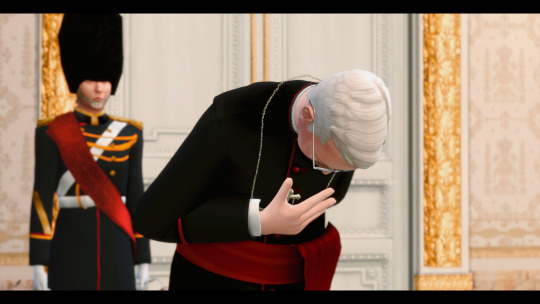
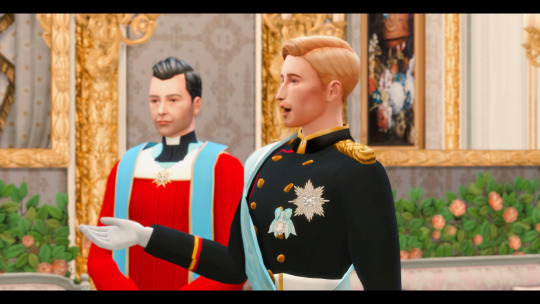
Mgr Zeller: Your Majesty, it is an honour Napoléon V: The honour is mine
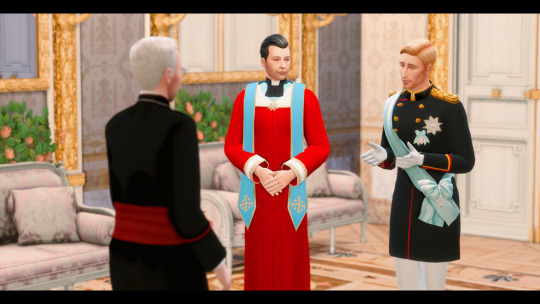
Napoléon V: Thank you for coming so quickly. The place of the Pope, my godfather, is central to my coronation in Paris. My advisers have informed me of conditions…
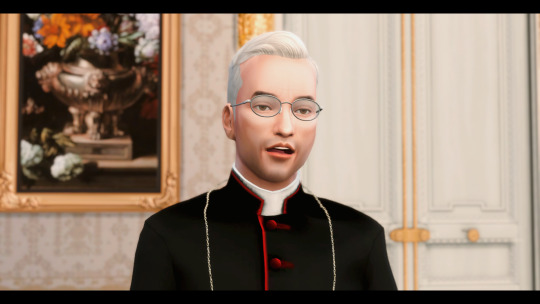
Mgr Zeller: Indeed, His Holiness wishes that his godson find a wife. It's traditional in the imperial ceremony that the Emperor is no longer free. Otherwise, the ceremony must take place in the Vatican
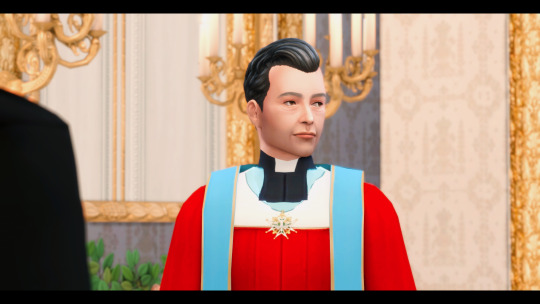
Mgr Morlot: In view of recent events, Your Majesty, it seems delicate that you are single while your sister has a partner

Napoléon V: Is His Holiness not prepared to negotiate all this?
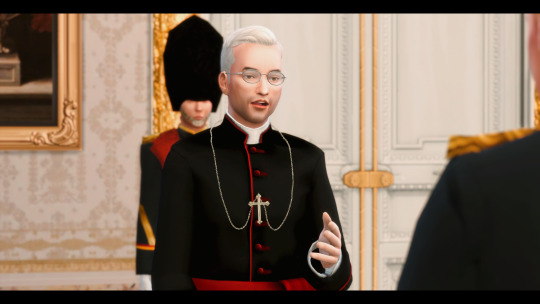
Mgr Zeller: Your Majesty, of course, I will attempt a discussion with His Holiness if you wish. But it's rare for such ceremonies to obtain papal concessions
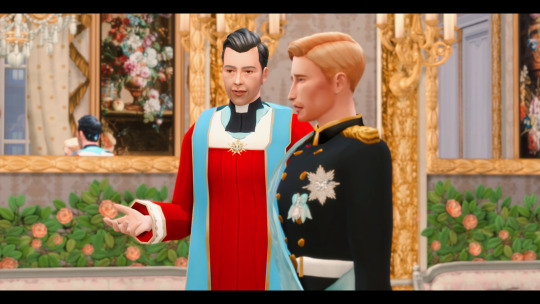
Napoléon V (pained): I see… Mgr Morlot: Come on, Your Majesty, you are quite old enough to marry a virtuous young woman. Why does that repel you?

Mgr Zeller: His Excellency Morlot is right, don't you have a young girl who makes your heart beat, Your Majesty?
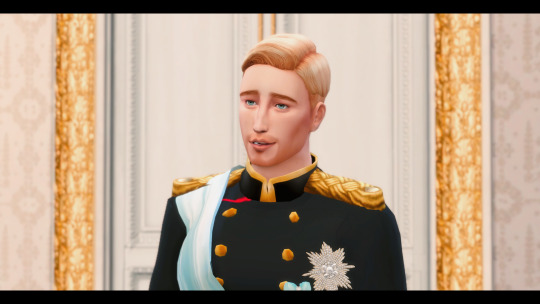
Napoléon V (embarrassed): I have… I have a sweetheart, yes. But we don't want to rush things, you see
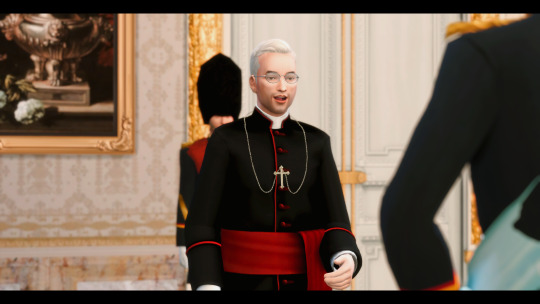
Mgr Zeller: Wonderful! Marriage is the most beautiful of the sacraments, Sire! Why not say yes to married love and embody the love of God?
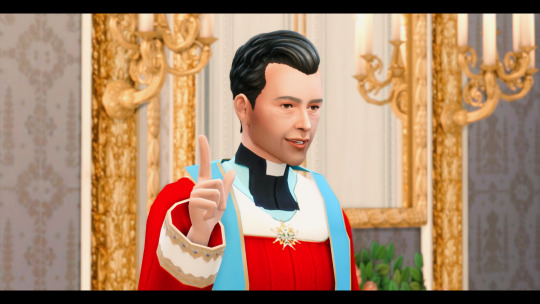
Mgr Morlot: I'll speak to Mademoiselle Charlotte de Rochechouart. She is perfectly suited to this role. And you have known her since you were a child. I consent to this union if it should be concluded, Sire!

Napoléon V: Excellencies, your words and your enthusiasm embalm my heart. I thank you. I can certainly envisage an engagement, although my beloved also imposes conditions on me

Mgr Zeller (laughing): A woman of spirit! I'm sure that she will be able to understand the situation, Your Majesty. Enjoy your youth and this beautiful love!
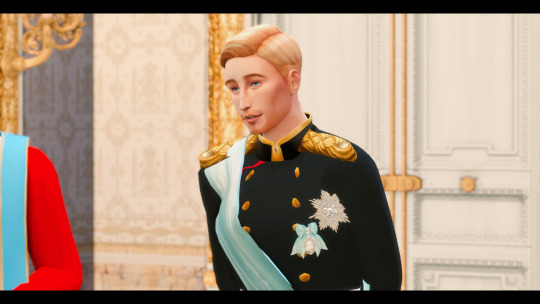
Napoléon V: Of course, Your Excellency. Please stay here while I talk to Mademoiselle de Rochechouart and my family. That way you can present the Pope with new avenues for discussion
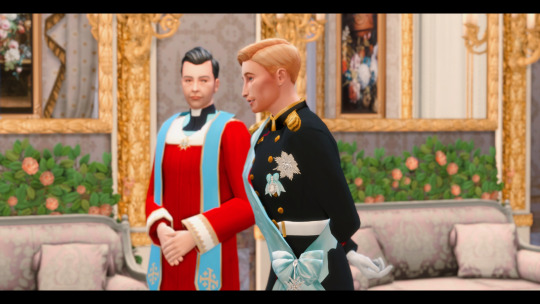
⚜ Le Cabinet Noir | Compiègne, 16 Floréal An 230
Beginning ▬ Previous ▬ Next
⚜ Traduction française
Mgr Zeller : Votre Majesté, c'est un honneur Napoléon V : Tout l'honneur est pour moi, relevez-vous
Napoléon V : Merci d'être venu aussi rapidement. La place du pape, mon parrain, est centrale pour mon couronnement à Paris. Or, mes conseillers m'ont fait part de conditions...
Mgr Zeller : En effet, Sa Sainteté souhaite que son filleul trouve épouse. Il est traditionnel dans la cérémonie impériale que l'Empereur ne soit plus libre. Autrement, la cérémonie doit avoir lieu au Vatican
Mgr Morlot : Au-vu des derniers événements, Votre Majesté, il apparaît délicat que vous soyez célibataire alors que votre soeur a un partenaire
Napoléon V : Sa Sainteté n'est-elle pas prête à négocier tout ceci ? Je pense que les Français se soucient peu de mon célibat pour le couronnement. La présence de mon parrain serait très bénéfique pour la Francesim et moi-même
Mgr Zeller : Votre Majesté, bien sûr, je tenterai si vous le souhaitez une discussion avec Sa Sainteté. Mais il est rare pour de telles cérémonies d'obtenir des concessions papales
Napoléon V (peiné) : Je vois... Mgr Morlot : Allons Votre Majesté, vous êtes tout à fait en âge d'épouser une jeune femme vertueuse. En quoi cela vous repousse-t-il ?
Mgr Zeller : Son Excellence dit vrai, n'avez-vous point une jeune fille qui fait battre votre coeur, Votre Majesté ?
Napoléon V (gêné) : J'ai... J'ai une dulcinée, oui. Mais nous ne souhaitons pas brusquer les choses, voyez-vous.
Mgr Zeller : Merveilleux ! Le mariage est le plus beau des sacrements, Sire ! Pourquoi ne pas dire oui à l'amour conjugal et incarner l'amour de Dieu ?
Mgr Morlot : Je parlerai à Mademoiselle Charlotte de Rochechouart. Elle est tout à fait désignée pour ce rôle qui plus est. Et vous la connaissez depuis votre plus tendre enfance. Je consens à cette union si elle devait être conclue, Sire !
Napoléon V : Excellences, vos mots et votre enthousiasme embaument mon coeur. Je vous remercie. Je peux envisager certainement des fiançailles, bien que mon aimée m'impose elle aussi des conditions
Mgr Zeller (rigole) : Une femme d'esprit ! Je suis persuadée que devant la situation, elle saura être compréhensive Votre Majesté. Profitez de votre jeunesse et de ce bel amour !
Napoléon V : Bien sûr, Votre Excellence. S'il vous plaît, séjournez ici le temps que je m'entretienne avec Mademoiselle de Rochechouart et ma famille. Ainsi, vous pourrez présenter au pape de nouvelles pistes de discussions
#ts4#ts4 royal#simparte#sims 4 royal#royal simblr#sims 4 fr#sim : louis#sims 4#ts4 royal legacy#ts4 royalty#ts4 royal simblr#ts4 royals#le cabinet noir#compiègne#compiegne#ts4 royal story#sims 4 royal story#sims 4 royalty
47 notes
·
View notes
Text
L'homme propose... ou croit le faire
''L'homme propose, et Dieu dispose...''. Cette jolie phrase qui remet soigneusement chaque chose à sa place (et il paraît même que c'est dans ce cadre-là que les vaches seraient le mieux gardées...) est devenue une sorte de proverbe passe-partout. Elle reste d'une actualité brûlante, alors qu'elle date de 600 ans (''Homo proponit, sed Deus disponit'', tirée de L'Imitation de Jésus-Christ (XV ème siècle), bouquin dont très peu de gens savent qu'il est, de nos jours encore, le livre le plus imprimé de tous les temps, après la Bible. Je vais la prendre pour exemple de la distorsion de facto qui existe entre nos désirs et les réalités... qu'est ma situation personnelle à ce jour.
Ceux d'entre vous, chers Amis-lecteurs, qui avez eu la patience de lire jusqu'à la fin l'Addendum chronologique à mon avant-dernier éditorial (Le Trou) n'ont pas pu ne pas être admiratifs devant la précision des détails fournis, relatifs à tout ce qui devait se passer dans les 2 mois qui suivaient, en commençant par une petite visite sur mes terres jurassiennes suivie d'un assez long séjour sous les ciels glorieux de l'île Maurice. En permanence, il jaillissait de mes poches une foultitude de ''QR Codes'' aussi inquiétants que perturbants : on voyait que j'avais tout prévu !
Tu parles ! A peine arrivé dans le Jura, une infection pulmonaire --fille de l'embolie pulmonaire que j'avais si mal soignée au mois de mai dernier-- m'a transformé en chape de plomb. Impossible de faire quoi que ce soit. Abandonnant ma voiture dans mon garage, je suis rentré à Paris en train, dare-dare... avant une hospitalisation de plus d'une semaine à Ambroise Paré --Urgences, pour commencer, et Pneumologie, ensuite.
Adieu lagons verts, cocotiers frémissants, cocktails parfumés et eaux translucides presque tièdes, où la vie foisonnante est si jolie à contempler à travers le masque de plongée... Adieu couchers de soleil sanglants ou petits matins rouges et or... Adieu, projets colorés et sables doux sous les pieds... Adieu, même, la célèbre ''vague'' Manawa, qui étend son rêve pour surfeur sur plus de 7 km : Esculape et Hippocrate semblaient s'être ligués contre moi pour m'assurer un futur proche exclusivement rempli d' IRM et de ponctions pulmonaires --le genre de distractions dont on se prive sans trop de regrets... même si, tout bien mesuré, la vue de ''ma'' Chambre d'hôpital, plongeant du 5 ème étage sur le Bois de Boulogne, avec la Tour Eiffel comme fond de décor, est vraiment belle... ou pourrait l'être, n'était la grisaille uniforme et déprimante qui sert de ''toit'' à la Ville lumière, totalement éteinte par le sectarisme primaire d'une édile délitée...
Tout ce lyrisme, un peu triste tout de même, pour vous dire que tous les items contenus dans mon édito de fin octobre sont nuls et non avenus. Je vais tout faire pour me remettre sur pieds le plus vite possible et reprendre le petit train-train de notre rythme habituel (depuis novembre 2013, on a eu le temps de s'y acclimater, vous en récepteurs et moi en émetteur !), mais ma faiblesse extrême du moment ne me permet aucune promesse qui puisse être sérieusement tenue. Je vais tenter un retour sur vos écrans, mais je vais reprendre la phrase que j'utilisais hier pour vous parler de Trump : ''Que sera, sera..." !
H-Cl
3 notes
·
View notes
Text

Laurence Remacle et moi avons le plaisir de vous inviter au vernissage de notre exposition à la Secret Gallery. Le vernissage aura lieu le vendredi 11 octobre 2024 à partir de 18h. L’exposition se poursuivra les week-ends du 12 & 13 et du 19 & 20 octobre de 11h à 18h. Secret Gallery: 11 avenue Paul Hymans à 1200 Bruxelles - Woluwé-Saint-Lambert.
6 notes
·
View notes